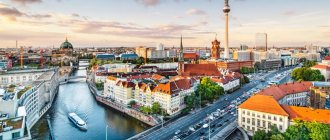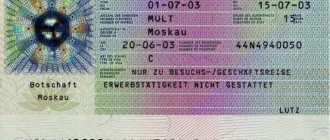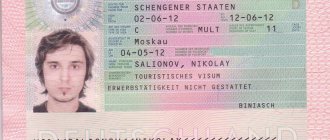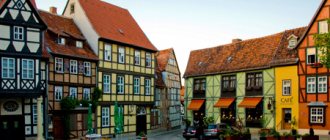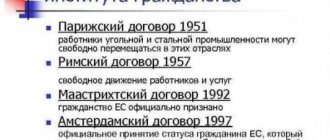Status of late migrants in Germany: who are late migrants
Conditions for participation in the program
Before leaving for Germany as a late immigrant, both pensioners and people of any age will have to document the presence of German blood.
Genetic code, surname, personal feelings do not count. The agency in Germany checks 3 conditions:
- The requirements for German ancestors have been met.
- Documents with the column “nationality” contain the word “German”.
- The status applicant can speak the language of his ancestors at a level sufficient to maintain a simple conversation.
Who can be a late migrant?
You have the right to submit an Entrance to the German Federal Administrative Office (BVA) for late resettled status in Germany if the following prerequisites are met:
- your date of birth is no later than December 31, 1992;
- Your permanent place of residence is one of the countries of the former USSR, with the exception of the Baltic countries;
- the documents of one of your parents or grandparents indicate German nationality;
- You have documents confirming your descent from a parent or grandparent of German nationality.
Settlers and/or late settlers?
Until January 1, 1993, the term “Settlers” (German Aussiedler) was used in relation to ethnic Germans who moved to Germany; ethnic Germans who moved to Germany since 1993 are called “Late Settlers” (German Spätaussiedler) as it is written in the Federal Law on expelled or forced migrants (German BVFG) §4. These are the official names of immigrants in the departmental language used in government agencies. In everyday life, migrants and late migrants from the countries of the former Soviet Union are simply called “Russian Germans” (German: Russlanddeutsche) or “Displacers”.
Ethnic Germans (German: Ethnische Deutsche, Deutschstämmige, Volksdeutsche, deutschsprachige Minderheit) are people of German nationality who live outside German-speaking countries and do not have German citizenship.
Official status
The status of a late migrant in Germany is secured by paragraph 4 of the above law. According to it, a late repatriate (Spätaussiedler) can be a subject of German nationality who, through the admission procedure (in Germany), left one of the former Soviet republics (Ukraine, Russia, Belarus) and within six months after that arrived for permanent residence in Germany, if in the territories of these countries such a subject resided:
- since the end of World War II;
- after being expelled or forcibly resettled from Germany after 04/01/1953.
It is worth noting that relocation to Germany as a late migrant is also possible for direct descendants of those persons who fall under the above conditions, as well as their spouses. In addition, the law allows Spätaussiedler status to be granted even to those who do not currently live in the former Soviet republics, but previously lived there after being forcibly resettled, provided that the candidate can present evidence of oppression on the basis of nationality.
According to clause 3 of paragraph 4 of the law “On the Affairs of Displaced Persons and Refugees”, a late migrant is recognized exclusively as a German, defined as such in Art. 116 of the Constitution of the Federal Republic of Germany. This status can also be obtained by spouses of persons whose German origin has been confirmed, as well as their children, which we will discuss later.
Restrictions
Persons with a criminal record for serious crimes cannot be accepted as late migrants.
Restrictions also apply to former law enforcement officers of the Ministry of Internal Affairs and the KGB of the USSR, employees of the prosecutor's office and the judicial system, diplomats and privileged members of the CPSU. Restrictions are also imposed if there were relatives in one of the listed positions.
Ways to obtain permanent residence in Germany
- Work in Germany. High qualifications, knowledge of the German language at B2 level, a profession in short supply in Germany (IT, engineers, builders, medical workers) - all these factors make it possible to extend a residence permit for five years and obtain permanent residence. Blue card holders can apply for permanent residence under an accelerated scheme - after 21 months of permanent residence in Germany with knowledge of German at level B1, or after 33 months with knowledge of German at level A1.
- Business immigration. An entrepreneur and his family members receive a residence permit in Germany for one year with the right to extend if the business turns out to be profitable. Business immigrants can apply for permanent residence in Germany after 3 years if the company is successful and has stable profits.
- Studying at a German university. The student receives a residence permit in Germany for 1–2 years with the right to extend until graduation. After completing their studies, a student can apply for a residence permit to search for work (up to 18 months), and upon concluding an employment contract - for permanent residence.
- Family reunification. In case of marriage with a German citizen or holder of a residence permit in Germany, the spouse and minor children can move to the country. The wife or husband of a German resident must know German at least at the basic A1 level. The spouse receives a residence permit with the right to extension, and after 3 years can apply for permanent residence or German citizenship.
- Marriage with a late immigrant. Spouses of ethnic Germans - descendants of immigrants from Germany - receive a residence permit for three years, then can apply for permanent residence and citizenship. Germans themselves and their children together receive German citizenship automatically without obtaining permanent residence.
- Jewish immigration. Jews and their spouses living in the countries of the former USSR (except the Baltic states) immediately receive permanent residence in Germany for six years with the possibility of acquiring German citizenship. Their children first receive a residence permit in the country.
Necessary documents for late migrants
The program for late migrants to Germany begins with the collection of necessary documents. First, you have to go through all the mandatory procedures in your country of permanent residence. You must provide documents and pass a language test at the German Embassy. After receiving a visa, late migrants can travel to Germany. The starting package of documents looks something like this:
- a fully completed application form in German indicating the full postal address (zip code, region, district, city/village, street, house/apartment number, home telephone number);
- passport;
- certificate of birth, marriage, divorce, birth of children;
- military ID;
- employment history.
If necessary, a translation into German is performed, which must be officially certified (apostille). An entrag (questionnaire) for late migrants can be obtained from the German Embassy. If relatives are involved in the case, then it can be found on the BVA website or downloaded from our website.
Features of document submission
First of all, to submit documents you need to register with the consulate. You should arrive 15–20 minutes before your scheduled time. You cannot take scissors, a nail file, or other similar items with you.
The document folder should contain:
- Russian passport and copies of all pages on which there are marks or entries. The passport must also indicate the registration address.
- A copy of the international passport (first page).
- Departure form from the nearest Federal Migration Service. This is confirmation that this person is not registered in Russia. (Registering again is not a problem, so there is no need to worry about this). Since service employees cannot discharge a person anywhere, they need to provide a specific address. This could be the address of Friedland, where the reception camp is located, or relatives.
- Original and copy of the acceptance notice.
- Two photos.
- Birth certificate and its copy.
- Marriage certificate and its copy. If there was a divorce or death of one of the spouses, there must be a corresponding certificate. If the name has changed, a document confirming this is required. All certificates must be submitted with copies.
- Medical insurance for 30 days. The beginning of the document's validity period is the expected day of receipt of the visa.
- Certificate (original and copy), if adoption of a child took place.
- Certificate of good conduct.
Important: if a family moves, all birth and marriage certificates must have an apostille.
All documents must be available. Any missing ones will still need to be submitted, but this will take longer to process the application.
Use the BVA website
In 2021, the design of the Bundesverwaltungsamt website has undergone significant changes. Now you can easily read information from your mobile phone or tablet. The web page loads much faster.
For later immigrants, the site provides complete information on the subject of Spätaussiedler in German. Logically, the data is divided into 4 sections:
- filing an application,
- departure to Germany and stay in Friedland,
- registration at the place of distribution,
- additions and clarifications.
The Bundesverwaltungsamt has updated its website design. Now it has become easier for late migrants to find information.
Each section and subsection is a set of questions and answers on a specific topic. The unique “pieces” of data fully cover the needs of immigrants. If you carefully read the fragments provided, there will be no problems with understanding the laws and procedures.
The additions deserve special attention. Many previously untouched and unexplained subtopics are now covered, for example:
- registration of pension,
- search through the Red Cross,
- charitable organizations for displaced people,
- recognition of education and work qualifications.
The only negative is that the site never got a Russian-language version.
Document analysis
The lawyer assesses your situation as a whole, checks the available documents, points out problematic issues and advises how to solve them in order to avoid refusal of admission to Germany.
As part of the consultation, we will indicate to you what documents are needed to submit the Antrag, where to request the missing documents and how to prepare them: what needs to be translated into German, notarized and apostilled.
To analyze the situation and assess the chances of success, it is necessary to provide the lawyer with complete information. In this case, the same principle applies as for a doctor - the work is based on absolute trust.
The lawyer is interested in getting you a positive decision on admission to Germany and protects your interests before the BVA.
Assessing the chances of obtaining late migrant status
You send the lawyer by email copies of documents of parents or grandparents of German nationality, adults in 1941, as well as documents confirming your relationship with them.
In a letter to a lawyer, you must also describe your situation in detail and answer key questions:
— Your year of birth?
* You cannot submit an Entrance yourself if you were born after December 31, 1992, but you can be included in the Entrance of YOUR parents or grandparents of German nationality.
— Have you changed your permanent place of residence?
If you left your permanent place of residence in one of the countries of the former USSR, indicate the reasons and attach the relevant documents.
— Is there repression of the family based on nationality?
If there are repressions (special settlement, labor army, supervision of special commandant's offices), send all the certificates about repression and rehabilitation of family members that you have.
— Did you or your parents occupy a high position during the years of the former USSR?
If yes, then describe in chronological order: period of time, position held, duties performed.
— Do you have a criminal conviction?
If you have a criminal record, send us a copy of the court decision, the lawyer will check whether your criminal record has been expunged, from the point of view of German law.
— Did your ancestors of German nationality apply for resettlement to Germany?
If Antrag was submitted by you, your parents or grandparents, send us by email the available documents: decision on admission to Germany, refusal of admission, last letter from the BVA.
The lawyer will analyze your situation and documents from the point of view of the law and the current judicial practice, give you advice on how best to proceed in your situation and offer you options for solving your problem, indicating the legal consequences for each option: paragraphs for you and members Your family, obtaining German citizenship, recognition of foreign pension experience in Germany, monetary compensation.
As part of the legal consultation, the lawyer will provide you in writing with a list of the required documents and indicate how they should be prepared, in accordance with current legal requirements and based on the latest memo of the German Federal Administrative Office.
You will receive detailed answers to all your questions related to obtaining the status of a late migrant in Germany within three working days after receipt of payment. We try to respond to our customers' requests as quickly as possible.
* If anything is unclear to you or you have additional questions, you can agree on a date and time and ask additional questions to a lawyer by phone, Skype or Whatsapp, or come to our office.
How to move to Germany from Russia, Ukraine and Belarus?
No matter how much you would like to make the immigration procedure to Germany easier, you will have to deal with paperwork that you cannot do without. The authorities have developed a program with a special algorithm of actions, without which the goal cannot be achieved. Below are all the steps you will have to go through:
- Obtain a national visa D, which provides the right to stay in the country from 3 to 6 months. To do this, you need to register with the Consulate to submit an application, prepare copies of a civil and international passport, a diploma of higher or special education, an employment contract, biography, work book and insurance. Then you will need to come and write an application in 2 copies, fill out the form in each field in 2 copies. Bring 3 photos with you for documents, pay the consular fee and wait for the decision. Depending on individual consideration, the period can last from 2 weeks to six months.
- If a positive response comes from the Consulate, then the next step is to look for housing in Germany and move.
- A mandatory condition for all migrants, except refugees, is the existence of a rental agreement or the purchase of their own. It is also necessary to obtain registration at the place of residence at the Town Hall.
- Open a bank account to transfer money from the government and employers. You will need to show your passport, income certificate and registration at the Town Hall. The advantage of the card is that it can be opened online.
- Get your tax ID to pay your taxes. You will need to come in person to the tax office and fill out a form. The employer will receive an automatic notification.
- Submit documents for obtaining a Blue Card. Within a month after moving, you must submit an application for a residence permit or an EU Blue Card.
Difficulties may arise with filling out forms in German if you do not know it perfectly. But this problem can be solved by contacting a special agency that will help not only with translation, but also with collecting all the necessary documents.
Conditions for applicants
In March 2021, the migration law was improved in order to attract more labor migrants from non-EU countries. If previously only specialists with higher education had the main priority, now holders of a diploma of secondary education who come to work are also required. To achieve this, competition with the local unemployed was removed. Confirmation of a diploma and presentation of a contract were sufficient.
IDPs can get a job within six months, but knowledge of the language is a prerequisite. A work visa is issued under an accelerated program. If you lack knowledge in your profession, you can improve your qualifications by obtaining a visa for a period of 18 to 24 months.
Documentation
To move to Germany and obtain a residence permit, you must prepare the following documents:
- an application to be completed in German;
- color photographs, 3 pieces;
- international passport and copies;
- civil passport and copies;
- certificate of confirmation of passing the language exam;
- a certificate from the bank confirming financial stability;
- medical insurance;
- certificate of no criminal record;
- confirmation of renting an apartment or purchasing your own home;
- certificate of knowledge of the country's immigration laws;
- papers confirming the existence of a basis for staying in the state.
Depending on the chosen method of emigration to Germany, a certain set of documents is required in addition to the above list.
For those planning to get married, you need to prepare:
- a copy of the application to the German registry office;
- a certificate from the Russian registry office stating that there are no reasons for marriage;
- birth certificate of the future spouse;
- copy of civil passport;
- Residence permit, if the union is concluded with a person who has permanent residence;
- registration of a German citizen at his place of residence in Germany.
For participants in a program promoting the reunification of all family members, it is enough to provide a marriage certificate, an invitation from German relatives and a birth certificate for children. Students moving to study must provide an agreement with a higher education institution, a certificate from the bank confirming the availability of money in the account at the rate of 8,650 euros per year, as well as confirmation of knowledge of the German language at level B1. Children under 18 years of age must take a birth certificate and, if the parents are divorced, permission from the other parent to leave their home country.
Those who are ready to move to Germany under an employment contract will need:
- employment contract;
- confirmation of diploma or qualification;
- work book, translated into German and certified by a notary;
- certificate of language proficiency;
- autobiography in German.
Insurance
Medical insurance is mandatory for those who decide to go to Germany to study, work or as a tourist. The basic requirements for the policy are as follows:
- insurance coverage from 30,000 euros;
- the company must be accredited by the German Consulate;
- there must be partner clinics in Germany;
- the policy includes emergency assistance, hospitalization and repatriation;
- no deductible in the policy;
- applies to all Schengen zones;
- The passport number must be indicated.
The policy is issued for a minimum of 90 days. The cost is calculated based on the initial parameters: purpose of the visa, period of stay in the country, age, etc.
Do you want to get a guaranteed second citizenship? Check out the rating of reliable migration companies!
Immigration visa
In fact, there are many different ways to go to Germany legally and illegally too, but the most common is to obtain a national visa D. You should go to the Consulate for it along with a package of documents and wait for a notification with a decision. To get an appointment you must pre-register. The consular fee is 75 euros. A mandatory detail is the submission of biometric data. The request is subject to consideration within an indefinite period from 3 weeks to several months. If necessary, the applicant may be called for an interview. If the answer is positive, you will receive a notification by email. If the answer is negative, then you will also be notified about this, but with an explanation of the reason. There is also a Schengen visa, which is issued for a period of 180 days and allows a stay in the country of 90 days. Designed for tourism, visiting relatives, undergoing treatment or taking short courses.
Obtaining a residence permit
At your place of residence in Germany, you need to come to the registration service and submit a request for a residence permit. The basis will be the presence of a D visa. A residence permit is an electronic card with a chip where all the data of its owner is stored. Consideration of the submitted application may last about 3 months from the date of submission to the migration service. Issued initially for 1 year, then extension is provided. After 5 years you can apply for permanent residence, and after 8 for citizenship. You cannot leave the country for more than 6 months so as not to lose your status. For submitting documents and considering an application for a residence permit, businessmen will have to pay 200 euros, employees 250, and the rest - 135 euros.
Obtaining permanent residence
You can obtain permanent residence only after living in the state for 5 years without leaving the country. There are also other conditions that must be met if you plan to go to Germany and stay in it:
- Availability of necessary funds in the account. The monthly income must be 1200 euros per person.
- Making contributions to the pension fund for 60 months.
- It is prohibited to break the law.
- Get a work permit.
- Level of German language proficiency A1-B2. You will also need to take special courses to study law and order in the country.
- Have rented or personal housing at the rate of 12 sq. m. for each family member.
Obtaining a German passport
The final stage is obtaining citizenship of the country. Late immigrants, children born in Germany or adopted by German citizens, etc. have certain benefits. If there are no such benefits, then you will have to confirm your knowledge of German, provide a certificate of absence of violations of laws and a bank statement indicating the presence of funds in the account sufficient to support yourself and your family. You will also need to pass a test to confirm your knowledge of German culture, politics and the basics of government. Germany does not accept dual citizenship, so you will have to renounce your previous one.
Ways to get a passport:
- Having lived in the country for 8 years.
- Restore citizenship lost in the period 1933-45 (also issued to children and grandchildren).
- Reunion with relatives.
- Marriage.
- By right of birth, if at least one of the parents has lived in the country for more than 8 years, he has citizenship or permanent residence.
- Investments that require opening a business in the amount of 250 thousand euros.
- Jewish immigration.
- Refugees receive a passport after 6 years of residence in the state; they do not have to prove knowledge of the language and laws.
How to confirm nationality
Nationality was indicated on birth certificates, passports, and military ID cards of the USSR. These documents will help confirm the nationality of the ancestor. The surname and name of the German ancestor do not matter. They do not have to be Germanic.
German ancestor of the late settler
To prove the presence of a German ancestor, you need to have his ID card with his date of birth. This document also verifies the requirement “16 years at the beginning of June 1941.” If a document is missing, you can add certificates of repression, extracts from archives, and a document of rehabilitation in the 1990s to the application.
What documents are needed for permanent residence in Germany?
Documents for permanent residence for foreigners who have lived in the country for more than 5 years:
- Statement;
- International passport;
- 2 biometric photos 35 x 45 mm;
- Certificate of income for the last three months;
- Confirmation of employment, salary certificate from the place of work;
- Certificate of registration;
- Confirmation of the availability of housing that meets established standards (purchase or rental agreement);
- Certificate of completion of the integration course;
- Language certificate of knowledge of German at level A1–B1;
- Medical insurance.
Documents for permanent residence for late migrants:
- Application form (Antrag auf Aufnahme nach dem Bundesvertriebenengesetz);
- Power of attorney (Vollmacht) for a representative from Germany;
- Notarized copies of foreign passports of family members that are included in Antrag;
- Notarized copies of certificates of family members (birth, marriage, divorce, adoption);
- Copies of birth and death certificates of German relatives;
- Certificate of no criminal record;
- Copies of the work book, diplomas, certificates, documents on opening an individual entrepreneur;
- A language certificate confirming knowledge of German at level B1 for the applicant and A1 for family members over 18 years of age.
Documents for permanent residence for Jews from the former USSR:
- Application form in German;
- International passport;
- Birth certificate;
- Military ID;
- Certificate, diploma of education;
- Employment history;
- Marriage certificate;
- Certificate of knowledge of the German language at level A1 and above;
- Confirmation of Jewish origin (birth and death certificates, old passports, house books, certificates from the archive);
- 2 photos 35 x 45 mm.
The applicant does not provide approval for the Jewish community in Germany - the migration department will require it independently.
Language test
Moving to Germany is impossible without knowing the language. This fact must be documented. You can get tested at the following places:
- Embassy in Moscow.
- Consulates General in Engels (Saratov region) and Novosibirsk.
Testing is carried out twice a year. Both the applicant and his family members must take part in it. Information about how the procedure works and when it can be completed is provided by department representatives after submitting the application.
Family members do not have to take the test if they have a certificate from the German Cultural Center. The minimum level of knowledge is A1.
If the original document on passing the sprach test has already been sent to Germany, you can only include a copy of it in the package of documents. At the embassy, when asked where the original certificate is, you will need to answer that it was sent to Friedland.
Sprachtest or how you speak the language
The ability to speak German is tested at the embassy during an interview - Sprachtest.
The applicant is invited to the sprach test in writing, setting a date in advance. You can reschedule the test by calling the embassy and arrange a new time.
The interview is designed to accurately establish the level of language proficiency. The criteria are subjective; the tester sums up the test results independently. The result cannot be appealed, but you are allowed to try to pass the “exam” multiple times. Obtaining the “title” of a late immigrant to Germany does not depend on the number of attempts.
The questions on the sprach test are tied to everyday and everyday topics. They will ask you to tell about yourself, your family, famous traditions, and professional activities. The dialogue may turn to the weather, news, weekends spent, a trip to the embassy - it is difficult to predict what an embassy employee may ask about in a particular case.
Language learning is permitted anywhere. It is not necessary to say that they absorbed the tongue with mother’s milk and reinforced it with grandmother’s tales before bed. But if the person being tested speaks the family dialect, there is no need to be shy.
Testing the main applicant's language skills is similar to an interview in German. An applicant only needs to know the language at level B1 to pass the practice test without any problems.
To qualify for language knowledge, a migrant needs to pass the exam with one module “Sprechen” for the B1 certificate - conversation. The module is equivalent to the Sprachtest at the consulate. The remaining 3 sections of the exam, if it is clear that you belong to the German people, are not required.
Exemption can be obtained if there is a medical certificate stating the inability to pass the test, signed by at least three doctors.
Aufnahmebescheid – admission decision
After checking the conditions for issuing the status and the successful outcome of the sprach test, an Aufnahmebescheid is sent - a document guaranteeing the issuance of the status. After a positive decision, the BVA sends a guarantee of accepting the migrant.
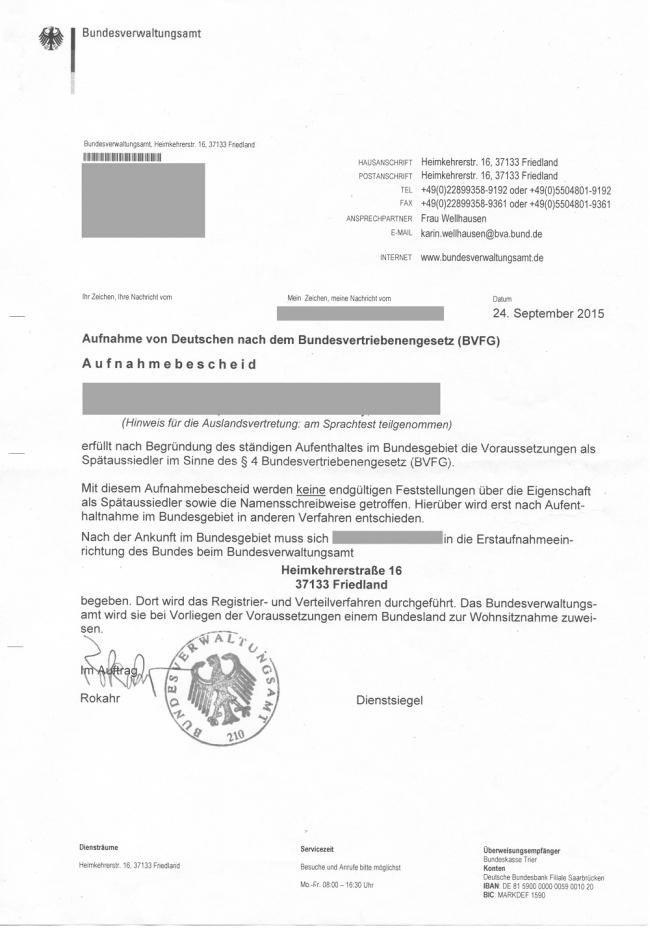
The call for permanent residence is valid as long as the main applicant who received the paper is alive. You are allowed to leave the Russian Federation/CIS, enter Germany and receive an Ausweis at any time. The recipient of the call has the right to include in the Aufnahmebescheid the spouse and direct descendants who are traveling under §7 BVFG. Father, mother, brother or sister cannot be included in the decision on relocation.
For a visa, adult relatives, at the stage of applying for entry or later, provide a certificate of knowledge of German at level A1 or undergo free testing at the embassy - Sprachstandtest.
To obtain citizenship by the spouse of the main applicant, the minimum period of marriage is 3 years before entry into the Aufnahmebescheid. If the marriage was formalized earlier, the move is based on “family reunification” as a foreigner under §8.
When the list of relatives is included in the call and determined, a request is sent to the embassy. A camp is open for migrants in Friedland - registration is required there. Upon arrival in Friedland, immigrants are given German dictionaries.
According to the standard process, you need to apply to the embassy for a late migrant visa type D. Planning a move under Schengen is risky, they may turn you away. The adaptation of “Russian Germans” - Russlanddeutsche - is an unofficial nickname for late settlers in Germany. After distribution among the federal states, new arrivals obtain certificates and passports at local mayor's offices.
Translation of documents into German
We translate and notarize with an understanding of the context and knowledge of German immigration laws. Translations fully comply with the requirements of the German Embassy. We work remotely with clients anywhere in the world.
What is Aufnahmebescheid?
When all the prerequisites are met, late migrants receive a guarantee of admission to Germany. The admission guarantee is unlimited and allows you to enter Germany at any time. The guarantee of admission may also include spouses and children of late migrants. They can obtain German citizenship on the same basis, but the marriage must have taken place at least three years ago. Otherwise, the spouse is considered a foreigner, and entry in this case is possible upon family reunification.
Parents, brothers/sisters, and other relatives cannot be included in the admission guarantee. It is possible to include in the guarantee the acceptance of minor children from another marriage.
How to obtain permanent residence in Germany: conditions
- Have lived legally in Germany for at least five years;
- Have sufficient financial resources in a German bank account to live in the country - from 130 thousand euros per family or a monthly income of 1200–1500 euros per person;
- Make voluntary or mandatory contributions to the state pension fund for 60 months;
- Comply with the law - during the last three years have not been brought to criminal or administrative liability;
- Obtain a work permit (for those who arrived on a work visa) or carry out other legal activities;
- Know the German language (level A1–B1) and complete an integration course aimed at studying the legal and social order in Germany and the federal state where the foreigner lives;
- Have your own or rented housing in Germany with an area of 12 m² for each family member.
Apartments in Berlin 432 ads on Tranio
429,000 € Two-room new apartment with a yield of 3.7%, Mitte, Berlin, Germany Total area 54 m² 1 bedroom
213,000 € Studio apartment in a new complex with a yield of 4.47%, Mitte, Berlin, Germany Total area 26 m² 1 bathroom
282,000 € Studio apartment with a large balcony in a new residential complex in the city center, Mitte, Berlin, Germany Total area 35 m² 1 bathroom
Camp Friedland - the last frontier
What to do after arriving in Germany? First of all, you need to go to the Friedland resettlement camp and undergo registration and an interview with BVA officials. After this, the permanent place of residence of the migrant will be determined - in most cases this is the city indicated in the application form, but if the city cannot accept the migrant, they will be redirected to another city. Late settlers do not stay long in the camp.
During your stay in the camp, you will be provided with a room to live in, as well as important documents that will be useful for registration in the city, integration courses, and benefits for late migrants. Late migrants arriving in Germany become citizens after completing all procedures in the camp.
German citizenship
Late immigrants can obtain German citizenship after fulfilling the prerequisites. You must register at the camp and register at your place of residence. A copy of the registration must be sent by mail to the department. After some time, a certificate of late resettlement (Bescheinigung des Bundesvertriebenengesetzes) will arrive by mail. With it you can get a German passport.
Spouses whose marriage is less than three years old receive a temporary residence permit upon entry, because enter Germany as foreigners.
It is worth noting that the entire process may take about one year. But sometimes things take much longer before late migrants move to Germany.
Roland Welcome, dear reader! I created a blog to share useful information about Germany. However, I am not a lawyer or an employee of the competent authorities. I cannot make any representations or warranties about the currency, accuracy, or reliability of the materials or comments. I wish you a pleasant journey through the pages of the blog, positive emotions and useful information. ShareFacebookVKTwitterPinterestWhatsApp




